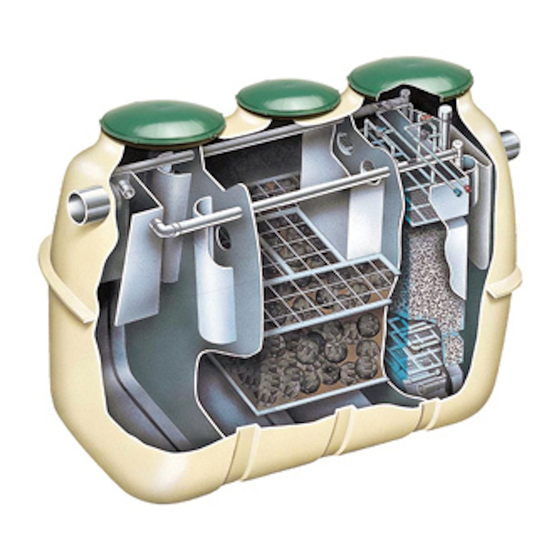Clarus Fusion Series Owner's Manual - Page 3
Browse online or download pdf Owner's Manual for Water Filtration Systems Clarus Fusion Series. Clarus Fusion Series 20 pages. Treatment systems
Also for Clarus Fusion Series: Owner's Manual (20 pages)

1.
Sedimentation Chamber
This chamber is designed to physically separate solids
from the incoming water. Scum is the floating material and
sludge is the material that has settled at the bottom.
2.
Anaerobic Chamber
This chamber contains a spherical skeleton-type filter
media, 4.3 inch diameter (109 mm). Through bacterial
growth processes on the surface of the filter media,
biological anaerobic treatment thrives while suspended
solids are captured. Furthermore, the microorganisms
in this chamber convert nitrates in the recirculated water
returning from the aerobic chamber to gaseous nitrogen.
The gaseous nitrogen then escapes to the atmosphere.
3.
Aeration Chamber
The aeration chamber consists of an aerated upper section
and a filter media lower section. The chamber is filled with
hollow, cylindrical filter media, 0.6 inch diameter (15 mm)
Figure 3 - Treatment Flow of the Fusion
Inflow
Sedimentation Chamber
1
2
Anaerobic Chamber
Back-Wash
3
Aeration Chamber
Storage Chamber
4
Effluent
The complete wastewater treatment system will typically consist of
the Fusion
treatment components and a soil absorption field for final
®
disposal of the liquid effluent. Some states or counties may require the
addition of a septic tank before the Fusion
chamber capacity and retain more solids. Please see Figure 11 for a
typical Fusion
system. Variations to the typical system will be made
®
to suit your particular site and system design needs. Please contact
your authorized Fusion
installer or maintenance provider for further
®
information about your system design.
THE FUSION
®
The Fusion
treatment unit utilizes an electronic, dual-port blower
®
designed specifically for use with this system. The blower consists
of a linear motor and two diaphragms to generate the air flow
necessary to aerate and recirculate water within the system. This
style of blower is quieter and more efficient than traditional rotary
vane compressors. Once installed and adjusted, circuitry within the
blower will automatically switch the unit from normal recirculation
mode to backwash mode and back again when appropriate. In the
event of a power outage, the blower will stop, but a backup battery
within the unit will retain the correct time and backwash settings.
PROCESS DESCRIPTION
®
System.
Recirculation
SYSTEM COMPONENTS
®
to increase the sedimentation
DUAL-PORT BLOWER
© Copyright 2020. All rights reserved.
and 0.55 inches long (14 mm). Biological treatment takes
place on the filter media surface. Aeration is continuous.
Residual suspended solids are captured by the filter media
circulating in this section. During normal operation, a
recirculation line transfers water back to the sedimentation
chamber.
The filter media in the aeration chamber are backwashed
regularly (twice a day, 5 or 10 minute cycle) by the
backwash system located at the bottom of the chamber.
The accumulated sludge is transferred back into the
sedimentation chamber for further digestion.
4.
Storage Chamber
This chamber is designed to temporarily store treated water
exiting the aeration chamber. This treated water is ready for
discharge.
Figure 4
®
Certified to
NSF/ANSI
Standard 40
Class 1
Performance
Designation
Blower
RATING
Voltage
Frequency
Insulation class
Operating time
CHARACTERISTICS AND PERFORMANCE
Voltage(V)
Current (A)
Power consumption (W)
Air volume (L/min)
Leak air volume(%)
Noice level (dBA)
Valve movement (N/L)
Temperature rise
3
NSF STANDARD 40, CLASS 1,
CERTIFICATION MARK
The NSF mark displayed here will
be on all NSF Standard 40, Class
1 certified Fusion
systems. The
®
Fusion
®
models ZF-450 and ZF-
800 will have the mark displayed
on the alarm panel. Systems not
NSF Standard 40, Class 1 certified,
will not display the mark.
Part # 5250-0050
AC120V
60H
z
A Rank
Continuous
Solenoid Valve
Solenoid Valve on
off
AC120V
1.8 or less
2.0 or less
71 ± 20%
77 ± 20 %
80 ± 10%
1.0 or less
2.0 or less
43.0 or less
75.0 or less
60 deg or less at 30 °C room
temperature
